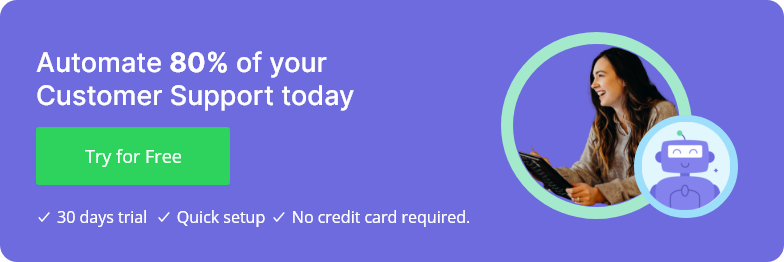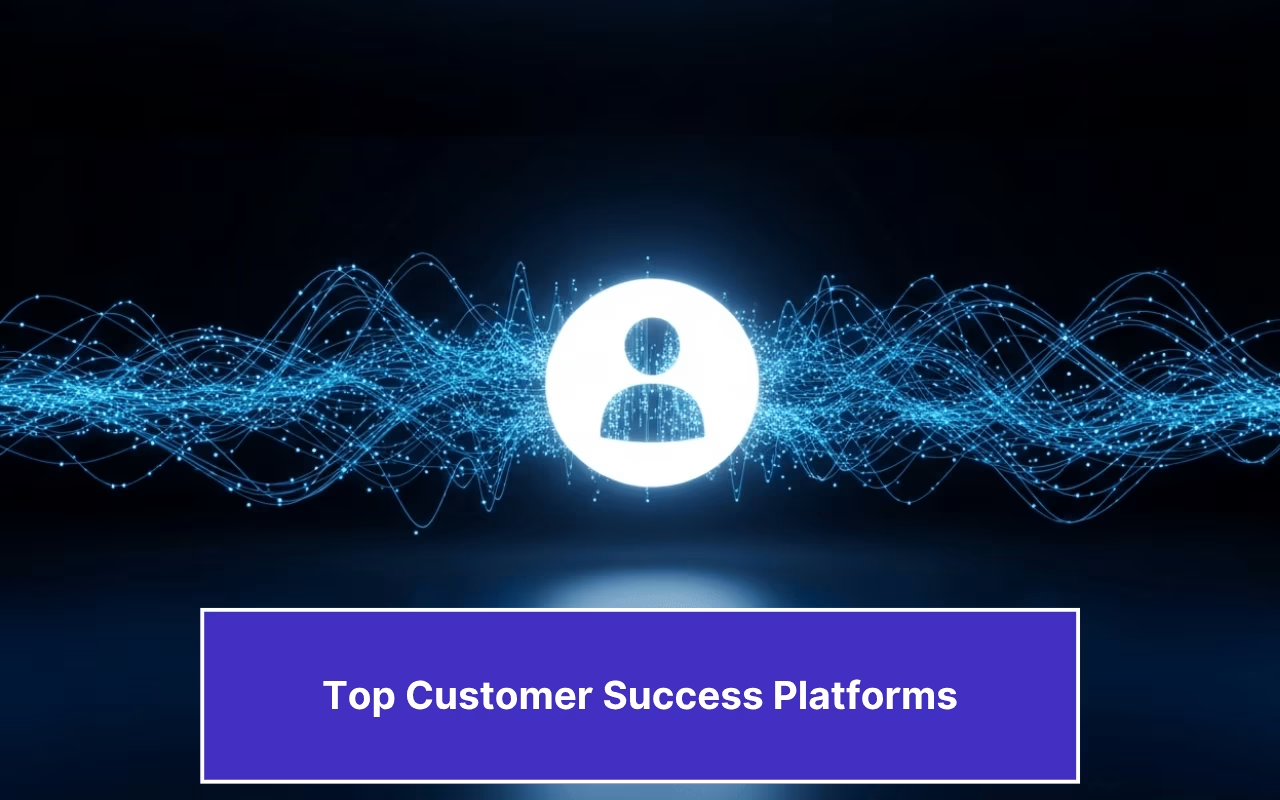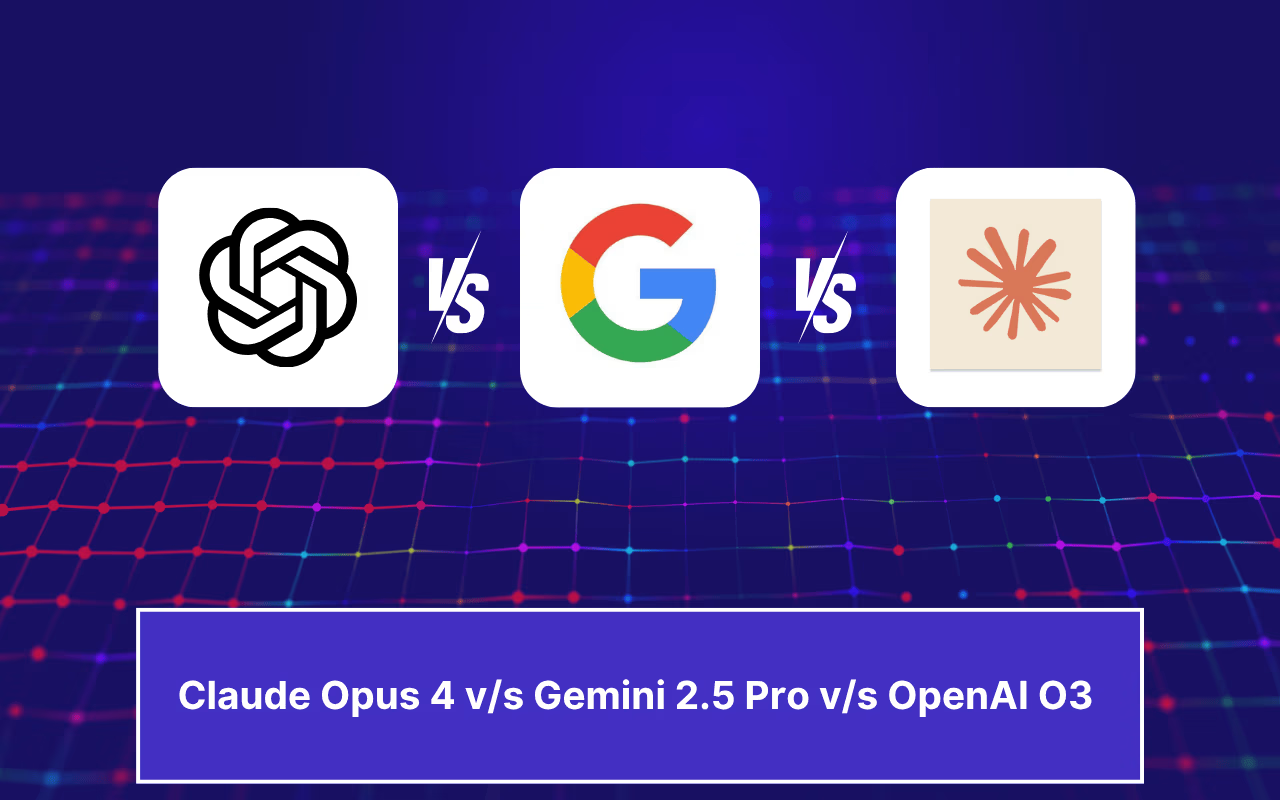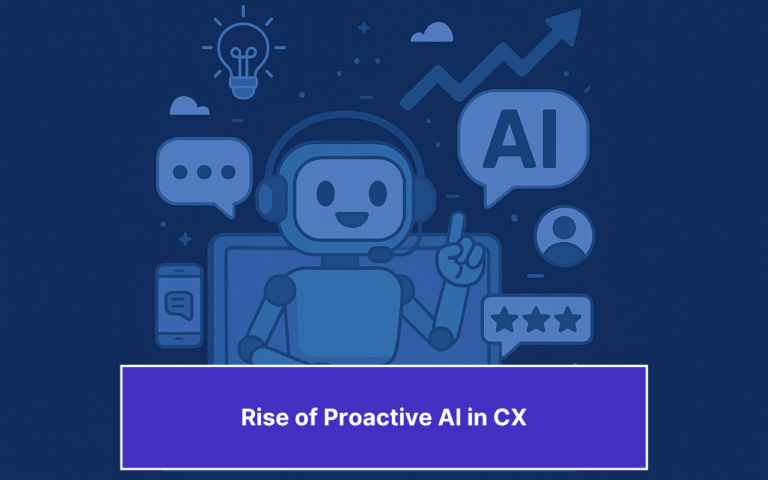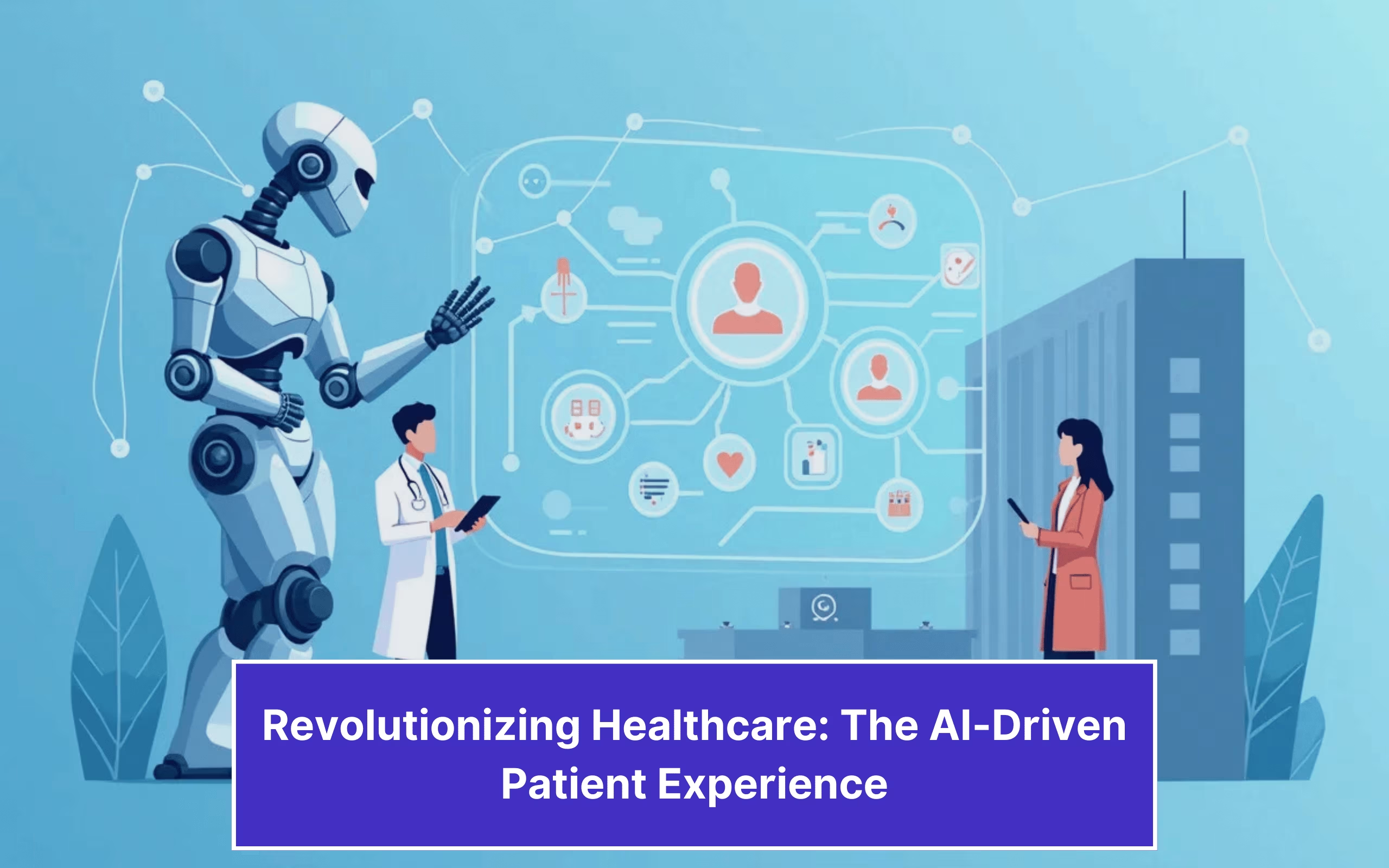
Artificial Intelligence has been making waves in all sectors, but it has proven to be especially powerful and disruptive in healthcare. It has revolutionized patient experiences through personalization, automation, increased accessibility, improved communication and interaction, and so on.
The integration of AI in healthcare has had a transformative impact on healthcare experiences through streamlined operations, personalized patient care, improved diagnostic abilities, etc. Unlike traditional human-centered healthcare experience, AI automation gets rid of the human bias and can scour through mind-boggling amounts of data to offer personalized patient experiences.
By analyzing huge amounts of data, AI can help offer precise insights, identify patterns, and predict outcomes that overall leads to a more streamlined operational process and healthcare delivery. Through the use of chatbots, self-service, and other AI tech, healthcare providers can better meet patient expectations 24/7 while reducing operational costs and improving efficiency.
This article will cover how the integration of artificial intelligence is revolutionizing healthcare experiences while offering a precise, scalable solution to modern healthcare challenges. We are going to talk about:
1. The Growing Role of AI in Enhancing Healthcare Experiences
2. Addressing Healthcare Disparities with AI & Digital Solutions
3. Challenges and Considerations in AI-driven Health Experiences
4. The Future of AI in Healthcare Experiences
The Growing Role of AI in Enhancing Healthcare Experiences
The real-world implications of AI in healthcare are boundless. Through AI automation, there can be a vast reduction in administrative workload while providing patients with round-the-clock care. It can improve diagnostic accuracy and offer patients personalized experiences by going through patients’ historical data faster than a human ever could.
AI chatbots can offer support 24/7, allowing patients to schedule appointments and raise doubts whenever the need arises. The chatbots can use natural language processing to seamlessly handle patient queries, reduce overall wait times, and improve accessibility. This vastly reduces administrative workload, allowing providers to focus on complex tasks and patient care while improving patient-provider communication.
Providers can use AI to streamline processes like billing, scheduling, and handling documentation. When routine processes can be automated, it improves administrative workflows, reduces the chances of critical errors, and overall leads to faster, more efficient operations that, in turn, increase patient satisfaction.
With the use of AI, providers can create personalized treatment plans by analyzing patients’ historical medical data in real time. AI can analyze years of documentation, genetic history, and current conditions to offer customized insights into patients’ unique needs. This precise approach can help predict the therapeutic needs of patients and improve overall treatment efficiency.
By studying their medical history, lifestyle, and genetic profile, artificial intelligence can help predict how patients would respond to different treatment plans and medications, thus, reducing the chance of there being adverse reactions.
But it isn’t just treatment plans where AI becomes effective. It can also monitor the effectiveness of the plan in real time by analyzing the patient’s current conditions, vitals, behavioral data, etc. Based on this data, it can tweak and adapt the treatment plan and suggest alternatives in case of adverse reactions.
AI can even predict and diagnose diseases even before symptoms appear in the patient. Using patients’ historical medical data, genetic makeup, and lifestyle, it can identify patterns and predict the appearance of diseases in individuals and offer preventive treatment plans.
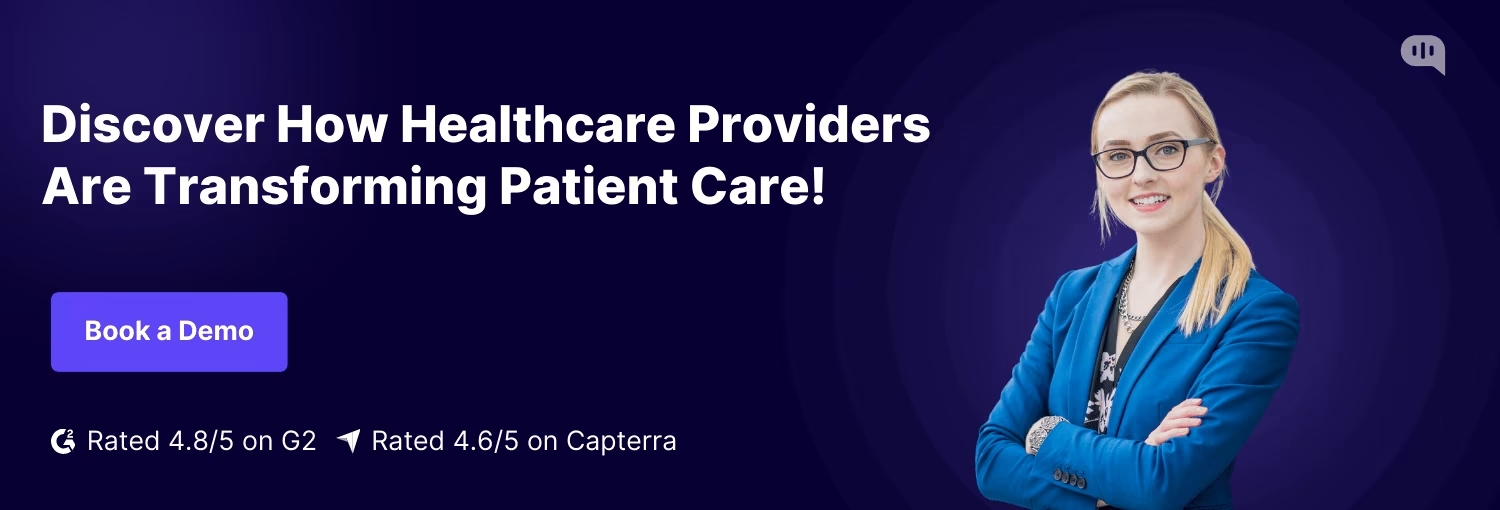
Addressing Healthcare Disparities with AI & Digital Solutions
Accessibility, be it financial, educational, or social, can often determine the kind of healthcare experiences patients have. Education level, for example, can seriously affect how patients understand diagnoses and follow treatment plans.
In fact, a study published in the National Library of Medicine in the US shows that persons without college education have over 4 times the mortality rates of their college-educated peers.
And education isn’t the only factor hindering the reception of proper healthcare among patients. Financial status also often determines what kind of care someone receives. The integration of AI, and the reduction of operational costs, which would ultimately reduce the overall treatment costs would make healthcare experiences more accessible for the general populace in the long run.
AI, with its large language models, can help bridge communication gaps, allowing patients to understand diagnoses, treatment plans, risk factors, and other information critical to improving their healthcare experiences.
Artificial intelligence can make use of tech like multilingual AI chatbots to reduce disparities caused by lack of education among the disadvantaged populace and present info in clear, simple language they understand. It would help reduce miscommunication and make healthcare more accessible and personalized no matter one’s education status.
But that’s not all. Multilingual AI chatbots and telehealth tech can bring healthcare to rural regions and underserved communities. This would significantly improve accessibility and address healthcare disparities at a grassroots level.
Challenges and Considerations in AI-driven Healthcare Experiences
The sheer potential of AI infusion in healthcare may be endless, but there are quite some challenges and considerations that need addressing before it can be successfully integrated. First is the question of bias and transparency. In a healthcare system where AI makes the decisions, there rise doubts regarding transparency, accountability, and AI bias. AI systems must be designed and used ethically so healthcare experiences remain equitable.
Another, perhaps bigger challenge is one of data security. To make decisions and predictions, and personalize care for patients, AI systems must handle and analyze all of patient data. This creates the potential for security breaches and unauthorized access to sensitive patient data. Integration of AI into the system must, thus, be coupled with robust cybersecurity measures and HIPAA compliance, ensuring patient data is protected at all times.
Ultimately, the key to AI-driven healthcare experiences is proper planning. Providers must strike the perfect balance between AI automation and human interaction to provide patients with empathetic and efficient care. The technology must further be integrated seamlessly enough that there are no problems or disruptions while providing patients with the proper healthcare experience.

The Future of AI in Healthcare Experiences
The future of AI in healthcare is rife with possibilities. Generative AI, predictive analytics, VR-assisted therapy will play a growing role in shaping patient experiences, bridging communication gaps, and addressing healthcare disparities.
Predictive analytics can help shift focus from reactive to preventive care by predicting health issues long before they become critical. AI tech can sort through and analyze patient’s data, medical and genetic history, and current condition along with vast amounts of medical research to simultaneously predict outcomes and offer tailored treatment plans that can prevent the occurrence of problems and keep patient conditions from worsening.
The role of generative AI in AI-driven healthcare experiences should prove especially interesting in the future. With the help of its large language model training, gen AI should be able to meet patients at their educational and linguistic levels. It will use cultural examples, colloquial terms, and easy language to close communication gaps between healthcare practitioners and patients. While multilingual chatbots communicate treatment plans and diagnoses to patients and their caregivers, virtual assistants can help answer queries 24/7.
The future of artificial intelligence in healthcare lies in providing tailored experiences to every patient no matter their education level, location, medical needs, etc. While predictive analytics will offer diagnostic support, remote monitoring tech will allow providers to monitor patient status no matter their location. The key word here is personalization.
With the help of AI, every step of the patient’s journey will be customized to their needs. From booking appointments, diagnoses, and designing of treatment plans to billing and addressing of queries, AI can help every step of the way. Such tailored treatment would create more trust in patients, who would feel valued and seen, which would in turn lead to better healthcare experiences.
The infusion of AI in healthcare will, thus, offer patients convenience and offer them round the clock support. It would reduce the workload on the human staff and improve operational efficiency while reducing costs, making healthcare more accessible to the general populace.
Conclusion
Artificial Intelligence today is poised to redefine healthcare experiences as we know it. With the help of AI chatbots and automation, healthcare providers can design hyper-personalized patient experiences and meet them at every step of their journey.
From the moment of appointment scheduling to billing, AI can help automate every task while making patients feel valued and increasing their trust in the system. AI chatbots and virtual assistants can help address customer queries no matter the time of day, all the while closing communication gaps and addressing healthcare disparities.
The future of healthcare is, thus, AI-driven personalized patient experience. Soon healthcare businesses will be striving to integrate AI solutions to automate tasks, reduce operational costs, and improve efficiency to deliver the best-in-class healthcare experience to patients. The time to invest in AI-driven solutions is, thus, now, especially if one is to stay ahead of the curve and of competitors by adopting an infinitely scalable tech that has been transforming the sector since day one.
As the Head of Growth, Marketing & Sales, Yogesh is a dynamic and results-driven leader with over 10+ years of experience in strategic marketing, sales, and business development.

